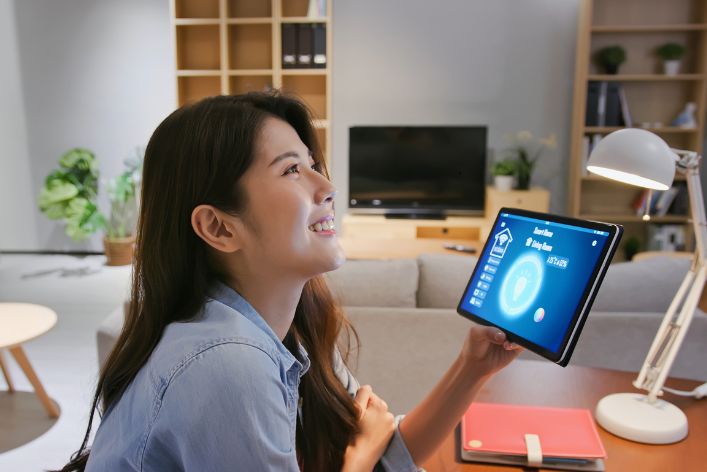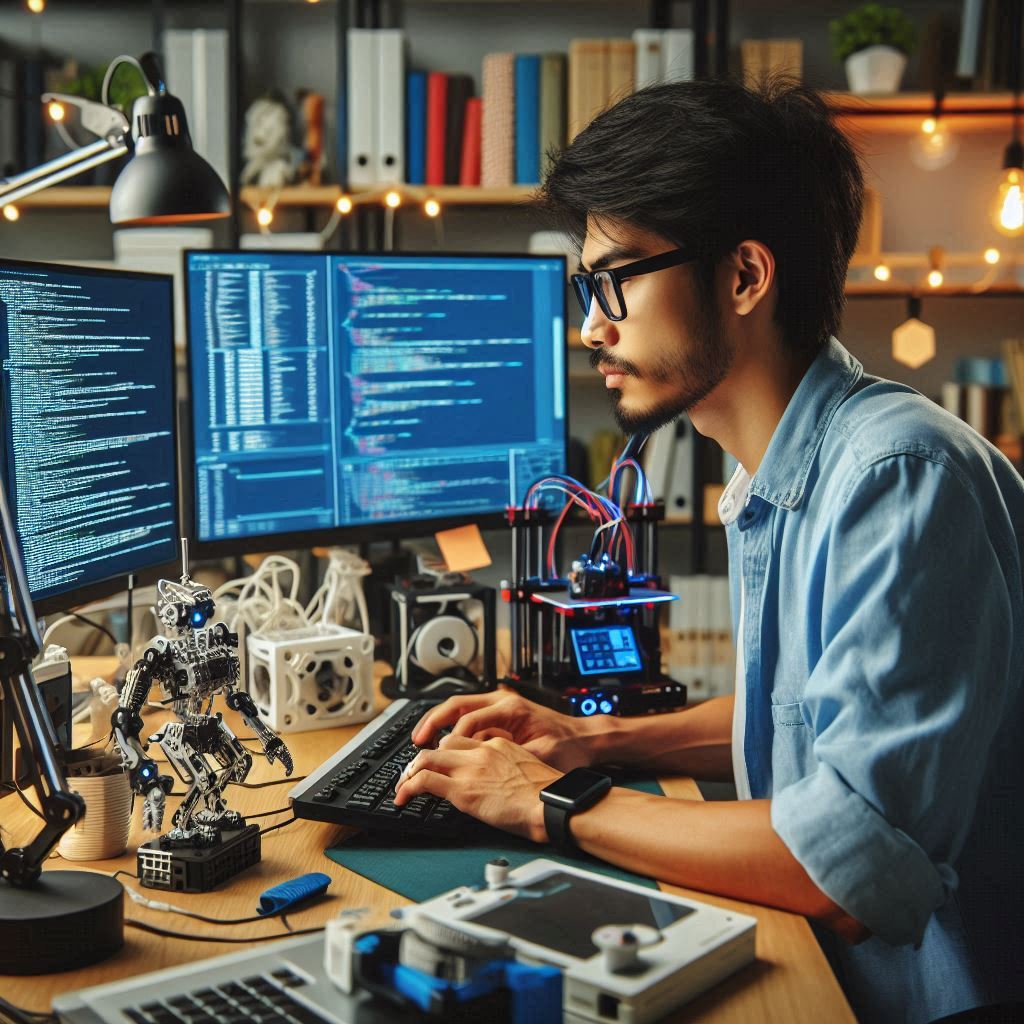The Internet of Things (IoT) presents an amazing idea. It is both highly theoretical and a functioning network used daily.
The IoT is reinventing the physical world. It alters our world by fostering opportunities almost beyond our imagination.
What is the Internet of Things?
The Internet of Things connects physical items.
These items exchange data without human involvement.
These things are integrated with sensors and other technology.
These gadgets range from commonplace household items to sophisticated IT sector tools.
Over the past decade, the IoT has become crucial.
It has gained significant importance, especially in recent years.
Devices now connect cost-effectively and analytically.
They provide access to technology and data, advancing the tech space and smart offices.
People, processes, and objects can all communicate with each other easily, thanks to IoT.
Sectors globally now integrate IoT into daily operations.
IoT gathers useful data, analyzes it, and helps make future decisions.
In homes, IoT operates domestic appliances without human intervention.
It even manages tasks like temperature control and lighting.
Innovative Tech Solutions, Tailored for You
Our leading tech firm crafts custom software, web & mobile apps, designed with your unique needs in mind. Elevate your business with cutting-edge solutions no one else can offer.
Start NowFor example, an air conditioner can adjust room temperature automatically.
Mood-sensing music systems, smart lighting, and automated windows also operate seamlessly.
Thanks to IoT, you can press a button to unlock the car door or play wireless music when leaving the house.
Read more: What is Internet of Things (IoT)?

How IoT Affects the Way We Live
Smart Cities
As more people move into cities, needs for water and energy rise.
This shift also increases risks of disease outbreaks, pollution, traffic congestion, and crime.
At the same time, an aging population is a problem for most of the developed world.
Governments install sensors in buildings and roads.
They create 3D virtual models of cities to research daily challenges more deeply.
For instance, 3D geospatial data in Singapore gives the government an in-depth perspective of every site so that city planners may examine instances of flooding, energy use, traffic congestion, and disease outbreaks.
By analyzing flood experiences, the government can develop emergency evacuation routes and waste systems.
Governments use energy data to plan solar panel installations and water retention features.
The government can use traffic flow analysis to assist plan new transportation routes.
3D data helps public health professionals track disease clusters by monitoring population density.
Major US telecommunications providers, like AT&T and Verizon, are developing smart cities.
They aim to promote their 5G services.
IoT-based smart cities use data to manage resources and traffic flow.
They build local economies and enhance quality of life.
Smart Homes
One of the first things that come to mind when you mention IoT is a “smart house,” and we are already well on our way to having them.
Security systems let you monitor your house from a distance, and smartphone apps can be used to control the lighting and heat and ensure the stove is off.
IoT technologies now enable individuals to track kids or pets left at home, which is perhaps the most crucial benefit.
Even better, you may install sensors that will alert you when specific doors in your home are opened.
It appears that domestic items will continue to become smarter.
How much longer until we have robots doing everything for us?
Seamless API Connectivity for Next-Level Integration
Unlock limitless possibilities by connecting your systems with a custom API built to perform flawlessly. Stand apart with our solutions that others simply can’t offer.
Get StartedHealth and Exercise
Tech enthusiasts may imagine “gyms of the future” with IoT equipment, but the technology is already available, at least on a personal level.
Smartwatches and wristbands, two types of wearable technology, have proliferated on the market and provide users with tailored information on their fitness and health activities.
Smartwatches are a step up from pedometers in that they can track your heart rate, calories burnt, and many other health information.
Additionally, IoT devices can be used to track general wellness rather than just physical fitness.
Numerous smartphone applications already exist that can track various medical information and the blood glucose levels of diabetics.
Heart rate monitors and wellness trackers are said to be included in the second-generation iWatch and Simband, which doctors might use to optimize patient treatment.
Driving and Traffic
The Internet of Things will profoundly alter how we drive, making it much safer and less stressful.
Real-time traffic conditions, such as when an ambulance or other emergency vehicle is approaching, can be adjusted by traffic signals.
In addition, sensors on the road will be able to adjust the speed limit based on the weather and past collisions, communicating directly with the vehicle’s dashboard about hazardous situations.
Other auto sensors may track engine performance, locate parking spaces, identify issues, and even summon assistance in an emergency.
As smart cars grow more interconnected, driverless automobiles will soon be a reality, revolutionizing daily commutes forever.
Groceries
Smart refrigerators with built-in cameras are now available, so you can inspect the contents while you are shopping.
Future smart refrigerators will send a shopping list to your smartphone when they detect you are running low on items like milk, eggs, or butter.
Based on your past purchasing history and typical buying habits, stores can send you reminders to add food and other products when they forecast that you are about to run out.
Reminders will be sent to your phone as you move through the grocery store so you never have to make the inconvenient second journey back.
Energy Consumption
We must support anything that can help us lessen our environmental impact.
Household appliances with high energy usage will change in response to changing price signals to reduce your electric costs.
Your home’s lighting and thermostat will be able to detect your individual routines and produce the ideal environment based on your daily activities.
Ensure, for instance, that your home is at the correct temperature before you get there.
These smart devices will also detect when no one is home and automatically turn off equipment to save money and minimize waste.
Also read: The Benefits and Applications of IoT
How IoT Affects the Way We Work
Smart Agriculture
Two things will have a significant impact on crop growth.
First, droughts are becoming more frequent and severe due to climate change, which encourages the growth of dangerous insects.
Second, farms will be understaffed due to the retirement of the baby boomer generation of farmers and a lack of replacement personnel.
Transform Business with Custom CRM & ERP Solutions
Elevate your operations with a CRM or ERP tailored for you. Let’s build the perfect solution that others can't replicate—crafted to match your business's needs like no other.
Get StartedFarmers can reduce water and fertilizer waste by determining the ideal time to irrigate, fertilize, or harvest by putting sensors around the farm and gathering data on temperature, air, soil humidity, and water level or by flying drones over the fields to collect data.
Big Data can also offer regional weather forecasts based on historical weather trends, aiding farmers in making more informed choices.
Smart Data Collection
For expansion and a promising future, every organization needs access to that organization’s data.
The Internet of Things gives you considerably better control over data handling and analytics monitoring.
It can provide access to how the devices interact with customers and make it easier for you to estimate user success, improving the user experience.
Any firm that wants to understand how its organization is operating and get a sense of user behavior must have access to data.
IoT assists in gathering this crucial data and directs you through the analysis process.
Cheaper, Greener Manufacturing
Device connectivity made possible by IoT will make “smart grid” technologies, which employ metres, sensors, and other digital tools to govern the flow of energy and can incorporate renewable energy sources like solar and wind, more widely adopted.
The Internet of Things will significantly cut costs in the manufacturing industry by lowering waste, fuel consumption, and the dumping of assets that are not commercially viable.
By supporting the conversion to renewable energy sources, IoT can further cut emissions by increasing the efficiency of energy transmission and production.
Customer Service
Customers are the lifeblood of the corporate world in many ways.
No business can succeed without the support and buy-in of its customers.
The Internet of Things has revolutionized the way that superior customer care is delivered.
Customers now have access to various useful tools to assist them in making purchases and interacting with businesses, thanks to IoT services and technologies.
Businesses can utilize the Internet of Things (IoT) to customize the customer journey by employing tracking technologies to learn customer patterns and preferences and provide them with a special experience that is based on what they are interested in or wants to buy.
Businesses can then disseminate this data within a wider network to help business leaders learn more about what their customers might like to see in the future.
Read: Applications of Artificial Intelligence (AI)

Negative Impact of the Internet of Things on Our Lives
Pose security threat
IoT devices that collect and share data are all around us, posing a security risk because people are unaware that these devices can collect sensitive information.
In the near future, hackers will find various ways to compromise these devices’ security.
This will make it difficult for regular people to stay updated with security issues.
Since technology like Alexa or Siri is continuously listening, there have been numerous instances where people have complained about someone overhearing their conversation in their house.
Automation of Jobs
Most businesses and companies use technology because it’s efficient and can complete complex tasks faster than humans.
This poses a threat that millions of jobs could be eliminated within the next 10 to 20 years.
Technology is becoming increasingly intelligent and capable of performing tasks far better than humans.
Tailored Tech Solutions to Drive Your Business Forward
Maximize your business potential with custom tech strategies. We deliver bespoke solutions that others can’t match, designed to solve your specific challenges with precision and impact.
Contact UsMany highly sought-after experts and workers could lose their value in the future when artificial intelligence replaces them.
Over-dependency on IoT
IoT has made it simple to like people since its major goal is to promote an unhealthy dependence on technology.
This makes individuals less productive because it limits their capacity for critical thought and creativity, making them impatient because they demand results immediately.
Read: Life with IoT Devices: Revolutionizing Personal and Professional Life
Conclusion
In summary, the Internet of Things is profoundly reshaping our world, from smart homes to advanced healthcare and efficient agriculture.
As IoT continues to evolve, it enhances our daily lives and work environments, making them more connected and streamlined.
However, it also brings challenges such as security risks and job automation.
Balancing the benefits with these concerns will be crucial as we move forward.
Embracing IoT’s potential while addressing its drawbacks will help us create a future where technology works for us, not against us.
Before you go…
Hey, thank you for reading this blog to the end. I hope it was helpful. Let me tell you a little bit about Nicholas Idoko Technologies.
We help businesses and companies build an online presence by developing web, mobile, desktop, and blockchain applications.
We also help aspiring software developers and programmers learn the skills they need to have a successful career.
Take your first step to becoming a programming boss by joining our Learn To Code academy today!
Be sure to contact us if you need more information or have any questions! We are readily available.











